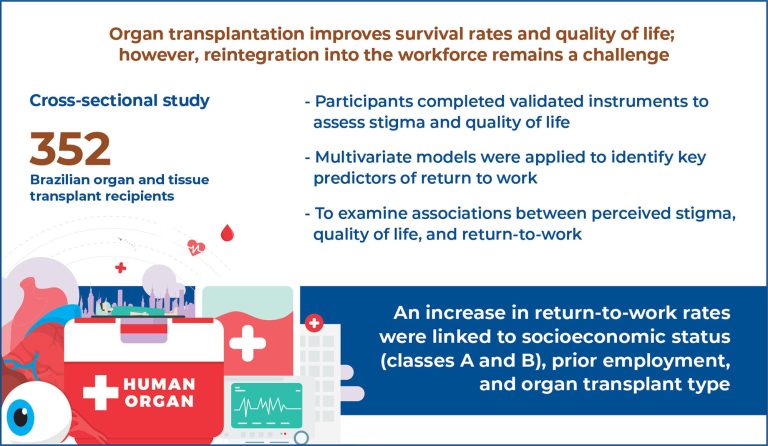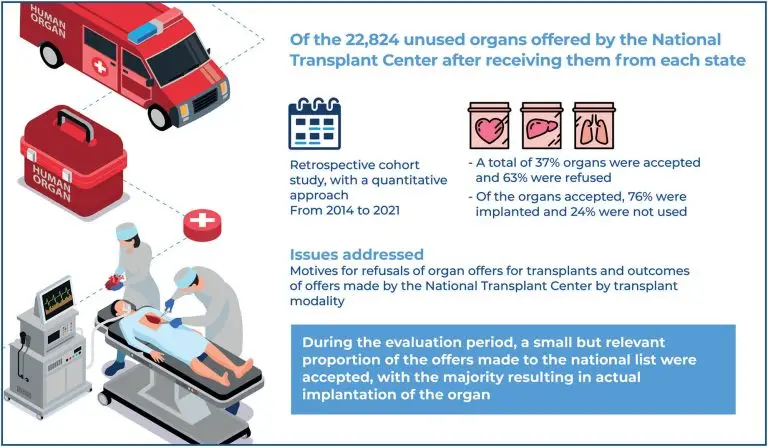31/Oct/2025
Stigma, quality of life, and return-to-work outcomes among organ and tissue transplant recipients in Brazil: a cross-sectional study
DOI: 10.31744/einstein_journal/2025AO1737
Highlights ■ The return to work rate was 53.7%, with slower and lower reintegration among low-income recipients. ■ Individuals with higher socioeconomic status (Classes A and B) were over twice as likely to return to work compared with lower socioeconomic status. ■ Higher stigma scores were significantly associated with reduced quality of life in Functional Capacity, Mental Health, and Social Functioning domains (p<0.001). ■ Older age (≥51 years), racial disparities, and unemployment before transplantation were strong barriers to occupational reintegration. […]
Keywords: Organ transplantation; Quality of life; Return to work; Social Stigma; Surveys and questionnaires
30/Jul/2025
Analysis of outcomes and reasons for refusing organs offered by the National Transplant Center
DOI: 10.31744/einstein_journal/2025AO1598
Highlights ■ Logistical factors were not responsible for most organ rejections in the single national waiting list. ■ Refusal information was operator dependent, as the reason for refusal was generic in most cases. ■ It is possible to increase the use of organs offered to the National Transplant Center by converting more offers into transplants performed through a more detailed study of the reasons for refusal. ABSTRACT Objective: To investigate the outcomes and reasons for the refusal of organs offered […]
Keywords: Organ preservation; Organ transplantation; Refusal to participate; Tissue and organ procurement; Transplantation; Waiting lists
04/Mar/2022
What is the role of heat shock protein in abdominal organ transplantation?
DOI: 10.31744/einstein_journal/2022RB6181
ABSTRACT Ischemia-reperfusion injury is a pathophysiological event occuring after abdominal organ transplantation, and has a significant influence on prognosis and survival of the graft. It is involved in delaying the primary function or non-functioning of the graft. The objective of this study was to provide information on heat shock protein mechanisms in ischemia-reperfusion injuries in abdominal organ transplantations, and to indicate the possible factors involved that may influence the graft outcome. Several classes of heat shock proteins are part of […]
Keywords: Heat-shock proteins; Kidney transplantation; Liver transplantation; Organ transplantation; Reperfusion injury
17/Jun/2021
Strategies for hemodynamic maintenance of potential brain-dead donor: integrative review
DOI: 10.31744/einstein_journal/2021RW5630
ABSTRACT Objective To learn about the scientific production on strategies adopted for hemodynamic maintenance of brain-dead patients. Methods Integrative review with articles published between 2007 and 2019, in Scientific Electronic Library Online (SciELO), Latin American and Caribbean Health Sciences Literature (LILACS), PubMed® and ScienceDirect. The descriptors “ Hemodinâmica AND Morte Encefálica ” and “Hemodynamics AND Brain Death” were used. Exclusion criteria were non-human research and gray literature. Results A total of 21 articles were listed. As strategies, the use of […]
Keywords: Brain death; Hemodynamics; Nursing care; Organ transplantation




